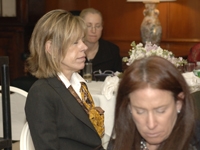
Iris Cantor
Leading doctors from the Iris Cantor Women's Health Center addressed members of the press on April 4, providing advice to women on cardiac health, protecting skin and limiting stress. The event was hosted by NewYork-Presbyterian/Weill Cornell and featured introductory remarks by Dr. Orli Etingin, director of the Iris Cantor Women's Health Center, and Iris Cantor, the center's benefactor and member of NewYork-Presbyterian Hospital's Board of Trustees.
During his opening remarks, Dr. Herbert Pardes, president and CEO of NewYork-Presbyterian Hospital, called Cantor "a great supporter of women and women's health" and the health center a "spectacular facility providing care for women throughout the city."
During her presentation, cardiologist Dr. Erica Jones talked about her hope of taking women's health "out of the bikini zone" and focusing on comprehensive issues facing women's health, specifically by paying attention to symptoms.
"Because women are traditionally caregivers, not caretakers, they tend to not take their symptoms seriously," said Dr. Jones, associate professor of clinical medicine at the Medical College. "They keep ignoring it."

Dr. Susan Evans leads attendees through a breathing exercise to help reduce stress.
Dr. Jones said that although new technology is fueling significant advances in the field, nothing can replace a traditional physical exam that provides an overall picture of a woman's health.
The event also featured a presentation by Dr. Susan Evans, associate professor of psychology in clinical psychiatry and a psychologist at NewYork-Presbyterian Hospital/Weill Cornell, on ways to limit stress.
"A certain amount of stress can be useful and productive, but we also know that chronic, prolonged stress can wreak havoc on our bodies," Dr. Evans said. According to Dr. Evans, the best lifestyle choices to decrease stress are vigorous exercise, a balanced diet, and eight to nine hours of sleep a night. Dr. Evans also led an interactive stress reduction exercise called "mindfulness meditation," which involves closing the eyes and focusing only on breathing for up to 30 minutes at a time.

Dr. Diane Berson
Dr. Diane Berson, assistant professor of dermatology, delivered a lecture on "winterizing" skin—providing advice on maintaining facial moisture levels during the harsh winter months.
Maintaining a healthy skin barrier is critical to preventing dehydration. "The bottom line is to promote barrier integrity and retain that barrier," said Dr. Berson. Elements such as temperature, UV light, hormones, stress and friction all attack the skin barrier, but using moisturizers that attract and retain water (humectants), soften skin (emollient) and reduce friction (lubricant) are the best for winter conditions.
The event was attended by members of the press from WABC-TV, Ladies' Home Journal, Self, All You Magazine, Tango Magazine and the National Association of Science Writers, among others.
Photos of press luncheon by Amelia Panico.

